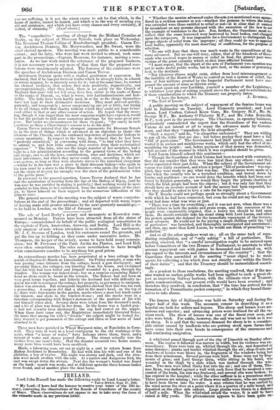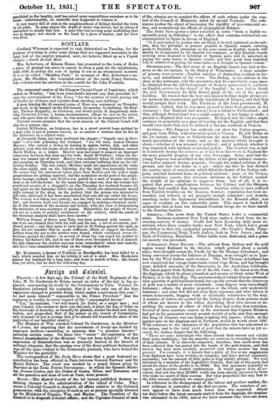IRELAND.
Lord John Russell has made the following reply to Lord Lucan's letter.
" Tarry-Bwlch, Sept. 27, 1851. " My lord Shave had the honour 'to receive your letter of the 23d in- stant, conveying the observations of the Boards of Guardians of the county of Mayo. "Ise observations do not appear to me to take away the force of ti yemerksinade in mrprevieus letter. " Whether the monies advanced- under theacte you mentioned wore squan- dered-in a 'redden manner or mot—whether the ,persons to whom the relief was extended were those:entitled to relief or not it is -clear that -it cannot be incumbent on any persons charged with the :execution of the law to set the example of resistance to the law. But, further, the Guardians must re- eollcct that the sums borrowed were borrowed by local bodies, and charged upon the ratepayers. It was impossible fora Government to distinguish the proper objects of relief from -the improper ; all they could do was to appoint local bodies, apparently the most deserving of confidence,-for the.purpose of selection. "No one will deny-that there was much-waste in the expenditure of the sums advanced. But no one will deny, either, that of the hundreds of thou- sands who received wages-in money or relief in food, the greater, part were victims ef the great calamity which atthat time afflicted Ireland.
"I must repeat, that the object of the sets of -Parliament-you mention was not to make useful public works, 'but to give food, or the means of procuring food, to the destitute.
"'But whatever abuses might exist, either from local Mismanagement or the inability of the Board of Works to control so vast a system of -relief, the sum of four millions granted by the Imperial Parliament must have surs passed the amount of sums so thrown away. "I must again ask yourlorrlithip, yourself a -meniber of the legillature, to withdraw your plea of setting yyourself above the law, and.to substitutafor it those considerations to which the Treasury can properly listen.
A public meeting on the subject of repayment of the famine loans was held in Ballinasloe on Tuesday. Lord Chmcarty presided; and Lord Lucan, Lord Crofton, .Colonel Knox Gore, Mr. Glop,. y M.P., Mr. St. George M.P., Mr. Anthony O'Flaherty M.P., and Mr. John Reynolds M.P., took part in the proceedings. The Chairman, in opening 'business, particularly contradicted the report that the Guardians of the various Unions do not intend at all to repay the advances made by Govern- ment, and that they "repudiate the debt altogether." "Such a report," said he, 4' is altogether unfounded." 'They-are willing to pay all 'the debts that are due; but before paying they must have a full "bill of particulars." The 'Government had itself spent the money, and wasted it in useless and mischievous works, -chi& only had the effect of de- moralizing the people ; and, before payment of 'that money was demanded, a full account of the manner in which it was expended should be. given.
Lord Lucan himself echoed this sentiment- " Though the Guardians of Irishilnions had been treated with contumely, they did not consider that they were less 'loyal than any others ; and they never repudiated their just debts. When the subject of the Government ad- vances was fairly examined, and when a proper 'hill of particulars ' 'was sup- plied, they were ready to pay. what was due. The advances were-made at a time when the country was in a wretched condition, and bowed down by famine and pestilence : no one would deny the benefits which had been con- ferred by English generosity, nor would they forget the private charities of which the Irish people had been the objects'; but it was only fair 'that they should have an accurate account of how the money had been expended, be- fore they should be asked to levy a rate for its repayment." Sir T. Bourke could not perhaps speak so strongly about a Government with which he had been connected, but even he could not say the Govern- ment had done what was wise or just. "There was a time for everything ; and it was-not now when there was a partial failure in both the potato and grain crops, -and Vic resources of the people were considerably enppled, that a heavy tax should be laid upon them. He should certainly take his stand along with Lord Lucan, and enter his protest against the demand for the immediate repayment of die Govern- ment advances. He would not be for paying a single Shilling until the bill of particulars' was furnished, and thoroughly investigated and scrutinized ; and then, any :none than Lord Lucan, he -would net think of preaching 're- pudiation.' " And so all the other speakers went on ; all on the same tack of repu- diating repudiation, and of "only asking" a bill of particulars. The i meeting resolved, that " a careful investigation ought to be entered upon before Committees of the two'Houses Of Parliament, 'to asnertain'to 'what amount repayment can withjustice be demanded and insisted on, with due regard to the interests and circumstances of the country " ; that the Guardians then assembled at the meeting -"remit object 'to be -made agents for collecting a tax which does not strictly COMIC within the limits of their duties" ; and that the Treasury should be memorialized accord- ingly. As a pendent to these resolutions, the meeting resolved, 'that if the 'mo- nies wasted on -useless public works had been artplied to such a great ob- ject as improving Galway harbour, with the ultimate view of Transat- lantic communication, vast present evils would have been averted ; and therefore they resolved, in conclusion, that'" the time has arrived-for the formation of a Transatlantic packet company;" in which they bound them- selves to take shares.
The famous fair of Ballinasloe was 'held on Saturday and dining the larger half of this week. The accounts concur in describing it as.a hopeful one both for sellers and buyers. 'The sheep and horses were nu- merous and superior ; and advancing prices were realized for all the va- rious stock. The show of horses was one of the finest ever seen, and sales were brisk. For cattle, however, the call was not so brisk as it was for sheep. It is said that the unusual demand 'for sheep is to a consider- able extent caused by landlords who are putting stock upon farms that have come into their own hands -in 'consequence of the enormous and still continuing emigration.
A whirlwind passed through prat of the city of Limerick en'Sunday after- noon. The course it followed was narrow iu width, but its violence was ex- traordinary. Trees were torn up, -whirled through the air, and deposited at some distance ; planks and timber whistled through 'the air; shop-fronts and windows of houses were blown in, the fragments of the windows being lost from their minuteness. Several persons were hurt. Some were cut by frog- merits of glass; and lord George Quin, while sitting in ifis 'hotel, was wounded in the thigh 'by a slate which was dashed -through the win- dow. Two men were lifted thirty feet intoihe air-, and one Of 'them, Tho- mas Ryan, was dashed against a wall with such force that 'he received a 'con- cussion of the brain, his arm was fractured, and several ribs were broken : he has expired in the hospital ; while the other sufferer is in a precarious state. Three persons are missing; two oh-them-were milk women, who are supposed to have been blown into the water. A man relates that he was carried bv the wind across the river at a point where it is a quarter Of a mile broad, and deposited on the other aide unhurt. Large planks were blown to a distance
of a mile. When the whirlwind struck the water, it is said to have raised it fifty yards. The phrenomenon appears to have been quite en-
paralleled-in the locality, anti hasraised some superstitious surmises as to its came : unfortunately, no scientific man happened to witness it.
A very heavy fall of minin the neighbourhood of Belfast flooded the town in all parts. In some places the depth of water was trivial, but in others it amounted to.nearly four feet. A man who was:moving some scaffolding that was in danger, was struck on the head by a piece of timber, and the blow was fatal.



























 Previous page
Previous page